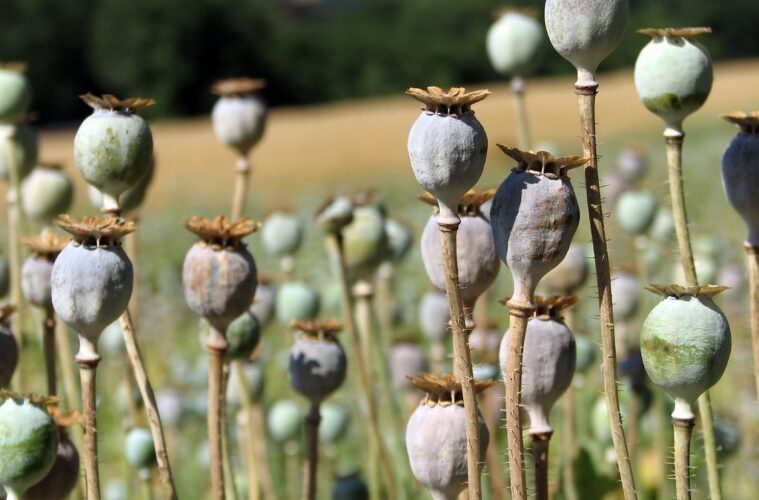Amin Karim passed a checkpoint heading into Kabul last October. His car was loaded with hemp. The Taliban checkpoint guards looked puzzled as they saw the plants in his car. They smelled and looked just like weed — you know, the plant rich in THC, the cannabinoid that gets you high. The guards were disgusted. They hadn’t heard of CBD before.
“They said to me: ‘Aren’t you ashamed of yourself, Haji?’” as they poked through the piles of hemp headed for Kabul, the Guardian reports.
Karim explained there were no psychoactive properties in the plants. He said they were working on a new project to tackle Afghanistan’s opium industry, which supplies most of the world’s heroin and has spawned an addiction crisis at home.
The guards were still confused. The CBD craze never hit Taliban-controlled Afghanistan. Although, the country’s new leaders promised to crack down on drug production.
The guards didn’t care that Karim was a veteran of the resistance against Soviet invaders, former peace negotiator and presidential adviser, and senior figure in the influential Hezb-i-Islami party. They believed their eyes and noses, rather than what Karim told them. The guards had no patience for Karim’s attempts to explain that the crop was grown without THC.
“They took it all away, and probably burned it. We were really scared they might take us and imprison us and say we had been dealing narcotics,” said Rayhana Karim, his daughter, who halted her career as a London restaurateur last year to move to Afghanistan and focus on humanitarian work.
The rest of that trial hemp crop, which should have been worth up to €6 a gram in European markets, is in storage. After the Taliban takeover, Afghan labs could no longer provide the international certificates needed for export.
However, the Karims and the charity they are working with, Hemp Aid, have not given up. They are instead working on alternative certification in Pakistan for exports and attempting to persuade the Taliban to approve the new crop for production in Afghanistan. They believe that the hemp industry could provide a suitable career shift for those who grow opium in the country and provide a solution to the malnutrition that cripples Afghan lives.
Malnutrition is a longstanding problem made worse by the economic collapse following the Taliban’s takeover last August. While some hemp strains are best for producing CBD oil, other strains are best for creating hemp fiber, which can be used to make protein-rich hemp flour. By weight, it can provide as much protein as beef or lamb, as well as many other nutrients, and the group hope to use it to enrich the wheat bread that is an Afghan staple.
The Guardian reports that in recent trials with a local bakery, researchers found that hemp mixed in with wheat flour at 7% doesn’t affect taste (higher levels of hemp were unpopular), but makes each piece of bread seven or eight times more nutritious.
The Karims are due to plant their first fields of hemp fiber plants in two eastern provinces soon. They hoped the crop might be less controversial than CBD plants because it doesn’t have much of a scent and looks more like sugar cane than a field of narcotics, but around 880 pounds of imported hemp seeds are currently stuck in airport customs.
Karim is talking to the Taliban leadership about getting the hemp seeds released, and CBD production approved. “We need to take this slowly and do some education as our mullahs don’t know much about this [crop],” one senior Taliban official told him.
Hemp is relatively easy to grow, store, and transport, and it uses less water than opium, says Hemp Aid co-founder Babur Kabiri. This is huge for a country that’s badly affected by rising global temperatures. Last year the country endured the worst drought in decades.
The ease of growing hemp is also essential for any attempt to ban opium farming. While the US attempted to eradicate opium production in Afghanistan for two decades, the country actually produced record crops. Although the Taliban also promised to eradicate opium, fields flourished across the country this year. Last year, Afghanistan’s illegal opiate economy was worth between $1.8 billion and $2.7 billion, the United Nations estimated.
Opiates earned more than all legal exports of goods and services combined and supplied eight out of 10 users globally. Replacing such a lucrative crop will continue to be a tough challenge. Pushing poppies makes middlemen rich, but for the desperately poor farmers producing opium, it is often the difference between hunger or feeding their families. Even if many feel uneasy about farming poppies, they feel they have few alternatives.
That’s why Karim and his daughter believe hemp is the solution. Karim is working on a new political proposal for the Taliban to find their way back from political isolation. CBD and hemp flour have become a passion since he turned a parking lot near his house into a first experimental field. “After you take the oil, you can use the rest of it to produce fiber, make shoes, clothes, paper, brick, walls,” he says. “Every part of this plant is useful.”
Afghanistan has been famous for its landrace cannabis strains since hippies — like the Brotherhood of Eternal Love — first started smuggling seeds and hashish back from Kabul and into the US six decades ago. Karim, who has never smoked cannabis, reckons Afghanistan may be able to capitalize on that fame.
“Afghanistan is famous for this plant all around the world,” he said. “If we can install a lab in Kabul, we will be able to manufacture a multitude of products and to export to the entire world under an Afghan brand.”


